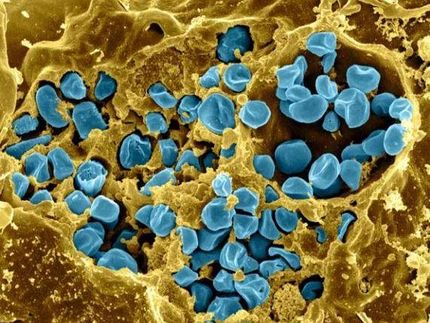One-two punch may floor worst infections
McMaster University researchers have found a new way to treat the world's worst infectious diseases, the superbugs that are resistant to all known antibiotics.

The figure shows an atomic force microscopy image of an E. coli bacterium treated with pentamidine. The magnifying glass highlights the high resolution topographical analysis and perturbations to the cell surface that are caused by pentamidine.
McMaster University
The discovery of an effective combination therapy has the potential to change medical practice for the treatment of the drug resistant infections which the World Health Organization (WHO) last week identified as of "critical priority" for their threat to human health.
"We looked for compounds that would mess with these bacteria, and I think we're nailing it," said Eric Brown, senior author of the paper, a professor of biochemistry and biomedical science at McMaster's Michael G. DeGroote School of Medicine and a scientist of the Michael G. DeGroote Institute for infectious Disease Research.
His team focused on Gram-negative bacteria which are resistant to all antibiotics including last resort drugs, such as colistin, and lead to pneumonia, wound or surgical site and bloodstream infections, as well as meningitis in healthcare settings.
Gram-negative bacteria have an intrinsically impenetrable outer shell that is a barrier to many otherwise effective antibiotics, and this makes these infections deadly, particularly in hospital settings. His team tested a collection of 1,440 off-patent drugs in search of one that might compromise that barrier in the superbugs.
"These pathogens are really hard nuts to crack, but we found a molecule that shreds that shell and allows antibiotics to enter and be effective," said Brown.
The scientists discovered the antiprotozoal drug pentamidine disrupts the cell surface of Gram-negative bacteria, even the most resistant. The anti-fungal medication was particularly potent when used with antibiotics against multidrug resistant bacteria.
Pentamidine, when used with other antibiotics, was found to be particularly effective against two of the three pathogens which the WHO has identified as having the most critical priority for development of new antibiotics. Those were Acinetobacter baumannii and the enterobacteriaceae. The combo therapy also had some impact on the third most critical bacteria, Pseudomonas aeruginosa.
The discovery was found to be effective in the lab and in mice, but more work is needed to offset potential side effects and ensure human safety. Brown added that his lab is continuing to test more compounds as well.
"One of the things we want to pursue further is why this is working so well."
Original publication
Jonathan M. Stokes, Craig R. MacNair, Bushra Ilyas, Shawn French, Jean-Philippe Côté, Catrien Bouwman, Maya A. Farha, Arthur O. Sieron, Chris Whitfield, Brian K. Coombes & Eric D. Brown; "Pentamidine sensitizes Gram-negative pathogens to antibiotics and overcomes acquired colistin resistance"; Nature Microbiology; 2017
Most read news
Original publication
Jonathan M. Stokes, Craig R. MacNair, Bushra Ilyas, Shawn French, Jean-Philippe Côté, Catrien Bouwman, Maya A. Farha, Arthur O. Sieron, Chris Whitfield, Brian K. Coombes & Eric D. Brown; "Pentamidine sensitizes Gram-negative pathogens to antibiotics and overcomes acquired colistin resistance"; Nature Microbiology; 2017
Topics
Organizations
Other news from the department science

Get the life science industry in your inbox
By submitting this form you agree that LUMITOS AG will send you the newsletter(s) selected above by email. Your data will not be passed on to third parties. Your data will be stored and processed in accordance with our data protection regulations. LUMITOS may contact you by email for the purpose of advertising or market and opinion surveys. You can revoke your consent at any time without giving reasons to LUMITOS AG, Ernst-Augustin-Str. 2, 12489 Berlin, Germany or by e-mail at revoke@lumitos.com with effect for the future. In addition, each email contains a link to unsubscribe from the corresponding newsletter.
Most read news
More news from our other portals
Last viewed contents

How to use antibodies to control chemical reactions - Researchers developed a strategy to synthesize functional molecules with specific diagnostic antibodies
Artificial intelligence could improve therapy for lymphoma
Category:Psilocybe

A fungus converts cellulose directly into a novel platform chemical - A new process for the mass production of erythro-isocitric acid from waste could make the substance interesting for industry in the future

Bruker Announces Acquisition of Inscopix for Neuroscience Research - Head-Mounted Miniscopes Expand Neural Functional Imaging Capabilities
Evotec and Boehringer Ingelheim Extend and Broaden Research Collaboration - Strategic research collaboration continues for another 4 years at a value of EUR 15 million plus milestones and royalties
Hopes of a New Treatment Approach for Paralysis

KU Leuven spin-off AstriVax raises € 30 million to build vaccine platform - AstriVax to develop novel vaccines that are easy to produce, have reduced cold chain requirements, and offer broad and long-lasting protection

Manufacturers in the laboratory sector choose analytica - Large number of exhibitors registered more than a year before analytica























































